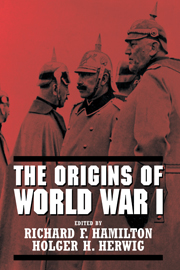Book contents
- Frontmatter
- Contents
- List of Tables and Maps
- Contributors
- Acknowledgments
- 1 World Wars: Definition and Causes
- 2 The European Wars: 1815–1914
- 3 Serbia
- 4 Austria-Hungary
- 5 Germany
- 6 Russia
- 7 France
- 8 Great Britain
- 9 Japan
- 10 The Ottoman Empire
- 11 Italy
- 12 Bulgaria, Romania, and Greece
- 13 The United States
- 14 Why Did It Happen?
- 15 On the Origins of the Catastrophe
- Appendix A Chronology, 1914
- Appendix B Dramatis Personae
- Appendix C Suggested Readings
- Index
5 - Germany
Published online by Cambridge University Press: 05 August 2012
- Frontmatter
- Contents
- List of Tables and Maps
- Contributors
- Acknowledgments
- 1 World Wars: Definition and Causes
- 2 The European Wars: 1815–1914
- 3 Serbia
- 4 Austria-Hungary
- 5 Germany
- 6 Russia
- 7 France
- 8 Great Britain
- 9 Japan
- 10 The Ottoman Empire
- 11 Italy
- 12 Bulgaria, Romania, and Greece
- 13 The United States
- 14 Why Did It Happen?
- 15 On the Origins of the Catastrophe
- Appendix A Chronology, 1914
- Appendix B Dramatis Personae
- Appendix C Suggested Readings
- Index
Summary
Even if we go under as a result of this, still it was beautiful.
General Erich von Falkenhayn, 4 August 1914These almost surrealistic words, uttered by the Prussian war minister in the wake of the July Crisis, in many ways encapsulate the mood that prevailed among Germany's political and military elite as July yielded to August 1914. In fact, Falkenhayn had played a decisive role in pushing for war. At 5 p.m. on the afternoon of 1 August, he had made his way through a throng of thousands of cheering Germans into the Neues Palais at Potsdam, and had witnessed Kaiser Wilhelm II sign the order for “war mobilization” on a desk made of planking from Admiral Horatio Nelson's flagship HMS Victory. “Thereupon,” Falkenhayn stated, “the kaiser shook my hand for a long time; tears stood in both of our eyes.” It was to be “war sans phrase,” as Falkenhayn recorded in his diary.
Historians since then have hotly debated the why of the decision to go to war. Was it, as John C. G. Röhl has suggested, to establish German hegemony over the Continent? Was it, in the well-known words of Fritz Fischer, a decided “bid for world power”? Or was it, as Andreas Hillgruber has posited, nothing more than an effort to secure the Reich's tenuous position as a European great power? Whatever their argument, these scholars have interpreted the decision for war within the twin parameters of the “cult of the offensive” and the “short-war illusion.”
- Type
- Chapter
- Information
- The Origins of World War I , pp. 150 - 187Publisher: Cambridge University PressPrint publication year: 2003
- 4
- Cited by



